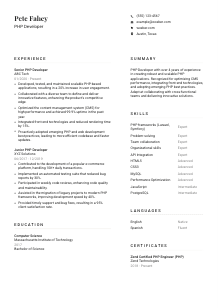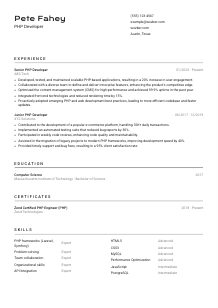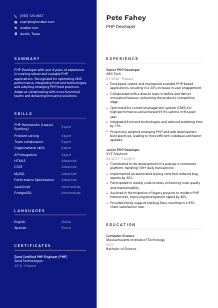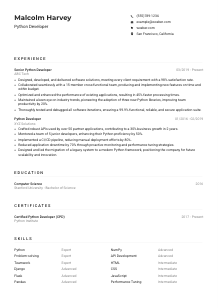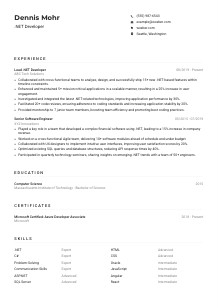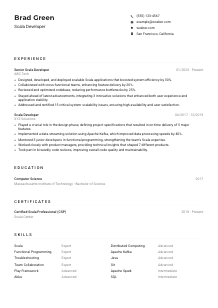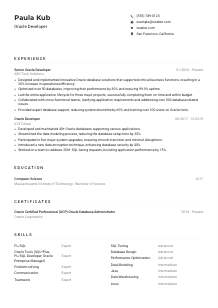PHP Developer Resume Example
Slicing arrays, but your resume feels like a loop? Check out this PHP Developer resume example, whipped up with Wozber free resume builder. Grasp how to arrange your PHP prowess to match job needs, so your career flows as smoothly as well-crafted code!
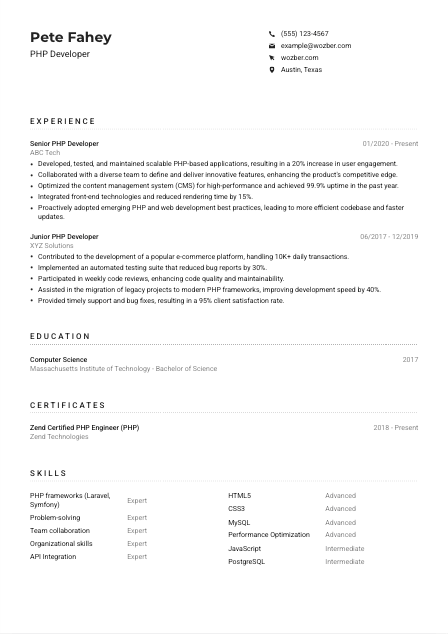
How to write a PHP Developer resume?
Hello there, future PHP Developer magician! In the realm of web development, where PHP reigns supreme, crafting a resume that spells 'hire me' at first glance is crucial. And guess what? You've stumbled upon the treasure map.
Whether you're a seasoned developer or eyeing your first gig, your resume needs to shout your prowess louder than the most articulate echo. Through this guide, empowered by Wozber's free resume builder and its ATS-friendly resume template and ATS optimization tools, we're about to embark on a creative journey to tailor your resume for that PHP Developer role you've got your eye on. Let's mould your resume into a beacon of your expertise and innovation.
Personal Details
In the codebase that is your resume, Personal Details serve as the declaration of your main() function – essential and syntax important. Let's ensure this section compels the hiring managers in Austin, Texas, to keep parsing through your resume.
1. Declare Your Name Loud and Proud
Think of your name as the <title> of your personal website; it's what gets displayed on the tab in your potential employer's browser. Make sure it's in a clear font and consider making it a bit larger to draw attention.
2. Job Title as Your Function Definition
Just like a well-named function in PHP clearly states its purpose, the job title below your name ("PHP Developer") aligns you with the role at hand. This not only catches the eye of the hiring manager but signals an exact match to the ATS.
3. Essential Contact Parameters
Package your contact details like you would your most accessible variables. This includes a phone number without typos and an email address that's both professional and straightforward, preferably in the firstname.lastname@email.com format.
4. The 'Located In' Attribute
"Must be located in Austin, Texas." Well, you're in luck if you are. Highlighting your local address immediately satisfies one of the primary requisites, ensuring you're seen as a practical, ready-to-onboard candidate.
5. Relevant URLs: Enhance Your Profile
Your LinkedIn or GitHub can serve as the repository of your accomplishments. Ensure any included link is a direct portal to further showcase your achievements, mirroring the dedication you'd bring to the role.
Takeaway
This section initiates the dialogue with your hiring manager. Crafted correctly, it's the handshake before the deep dive, setting the scene for all the professional tales you're about to unfold. Remember, precision and alignment with the role's specifics, including your locale and professional title, are key. You're now set for a great first impression.





Experience
As a PHP Developer, your experience segment is like your GitHub history - it showcases your contributions, projects, and the evolution of your skills. This is where the narrative of your career is spelled out, commit by commit. So, let's ensure it speaks volumes to the hiring manager at that tech firm in Austin.
- Developed, tested, and maintained scalable PHP‑based applications, resulting in a 20% increase in user engagement.
- Collaborated with a diverse team to define and deliver innovative features, enhancing the product's competitive edge.
- Optimized the content management system (CMS) for high‑performance and achieved 99.9% uptime in the past year.
- Integrated front‑end technologies and reduced rendering time by 15%.
- Proactively adopted emerging PHP and web development best practices, leading to more efficient codebase and faster updates.
- Contributed to the development of a popular e‑commerce platform, handling 10K+ daily transactions.
- Implemented an automated testing suite that reduced bug reports by 30%.
- Participated in weekly code reviews, enhancing code quality and maintainability.
- Assisted in the migration of legacy projects to modern PHP frameworks, improving development speed by 40%.
- Provided timely support and bug fixes, resulting in a 95% client satisfaction rate.
1. Fork the Job Description
First up, dissect the job description like you would a complex project requirement. For a PHP Developer, understanding the nuances between frameworks like Laravel and Symfony can set you apart. Highlight each requirement that directly speaks to your own expertise.
2. Declare Your Roles and Functions
Structure this section like a well-commented code, with clarity on your roles (job titles) and where you've worked (companies). Present it in an ordered list, starting with the most recent. This chronological stack trace helps tell the story of your development career.
3. Methods Implemented (Achievements)
Dive into the specifics. Use bullet points to detail your achievements, but here's the kicker - make them as quantifiable as a for-loop's iteration count. Did your code boost user engagement? By how much? These numbers are the runtimes to your efficiency claims.
4. Query Your Impact
Whenever possible, frame your contributions in a way that mirrors the impact you had. Just as a successful SQL query returns valuable data, ensure each point you list returns an insight into how you added value, solved problems, or improved processes.
5. Debug and Refactor
Finally, proofread. Just as you would debug code before pushing to production, ensure this section is free from errors. Keep it relevant; if it doesn't serve the narrative or align with the role, consider it commented out.
Takeaway
Each bullet point in your experience section contributes to your story as a PHP Developer. It's your proof of concept. As you fine-tune this segment, imagine the hiring manager tracing through your coding journey, nodding in approval at each 'commit.' With relevance and quantitative achievements, your experience speaks to not just what you've done, but what you're capable of accomplishing next.
Education
In technology roles, especially ones as nuanced as a PHP Developer, your educational background is the bedrock of your coding logic and problem-solving prowess. It showcases not just your acquired knowledge but your dedication to understanding the underpinnings of web development.
1. Define the Class Parameters
Pinpointing exactly what the job requires educational-wise sets the groundwork. For this role, a "Bachelor's degree in Computer Science or related field" was specified. Ensuring your resume reflects this qualification is priority one.
2. Structured Inheritance
Keep the format of this section straightforward but informative. Lay out your degree, the institution, and graduation date in a clean, organized manner. Think of it as defining a class in PHP - the structure matters.
3. Degree Variable
If the job description calls for specific educational requirements, and you meet them, make sure this is unquestionably clear. A "Bachelor of Science in Computer Science" is not just a degree; it's proof you've laid the necessary foundation.
4. Specialized Classes (Relevant Courses)
In some cases, listing relevant coursework can be advantageous, especially for newer professionals. While it wasn't necessary for our example, consider this if your degree encompasses a broader scope than the job requires.
5. Extend Your Qualifications
Graduating with honors, participating in technology clubs, or completing meaningful projects can be likened to extending a base class in PHP. These are your 'added methods' that give you more functionality and appeal.
Takeaway
Your education section is a testament to your readiness and foundational knowledge in the field of web development. It reassures the hiring manager of your capability to understand and apply complex technical concepts. By aligning this section with the job's educational prerequisites, you're signaling not just your qualifications, but your dedication to your development career.
Certificates
Just as plugins extend the functionality of your PHP projects, certificates enhance your resume by showcasing your commitment to continuous learning and specialization. They are tangible proof of your dedication to refining your skills, staying updated, and aligning with industry standards.
1. Review Your Library
Begin by auditing the certificates you hold. While the job description for this PHP Developer role didn't specify any, it's always a good move to include those that bolster your qualifications, like a Zend Certified PHP Engineer.
2. Select Relevant Extensions
Highlight certificates that align closely with the job's demands or the company's technology stack. Prioritizing quality over quantity ensures your resume showcases the most relevant and impressive achievements.
3. Time-Stamped Commits
Including the date of your certification can be particularly crucial for technology roles, given the fast pace of industry advancements. It's like showing the last update date on a plugin – it tells the employer you're current.
4. Maintain Your Repository
The technology landscape is ever-evolving, and so should your learning curve. Regularly update your certifications and keep an eye out for new ones that align with your career trajectory and the industry's future.
Takeaway
Think of each certificate as a specialized library you've added to your professional toolkit. They enhance your capabilities, demonstrating to employers that you're not just adept but actively engaged in growing and refining your skills. With each relevant certificate listed, you're showing a continuous commit to professional development, making your resume all the more compelling.
Skills
In programming, knowing a language's syntax is crucial, but how you apply it determines the success of your projects. Similarly, the Skills section of your resume provides the keywords and phrases that form the syntax of your professional expertise. Let's build this section to resonate with what the hiring managers and ATS are parsing for.
1. Break Down the Functionality
Start by identifying the skills directly listed in the job description, such as "strong proficiency with PHP frameworks like Laravel or Symfony." This first pass helps ensure your resume speaks the same language as the job posting.
2. Declare Your Variables
For each skill you possess, consider if it's hard (technical, like "MySQL") or soft (transferable, like "problem-solving"). List them in a clear, organized manner, ensuring the most relevant ones to the PHP Developer position stand out.
3. Code for Readability
While it might be tempting to list every skill you've acquired, focus on those that matter most to the role. This keeps your resume clean, and your skills section becomes a concise summary of why you're the ideal candidate.
Takeaway
By listing skills that align directly with the job's requirements, you're offering a sneak peek into your professional toolkit. This section should reflect a blend of technical prowess and soft skills, showcasing a developer who's not only technically proficient but also a collaborative and adaptable team player. You're essentially highlighting your unique algorithms that solve problems effectively – making you an irresistible candidate.
Languages
While PHP might be your primary language, the ability to communicate in multiple languages can significantly boost your appeal, especially in diverse or international teams. Much like being proficient in different programming languages, each additional language you speak fluently adds versatility and value to your professional portfolio.
1. Sys.Get() the Requirements
"The ability to communicate effectively in English" was highlighted as a key skill. Ensure your proficiency level in English (e.g., Native or Fluent) is prominently displayed.
2. Enhance Your Localization
Apart from English, listing other languages you are fluent in, like Spanish, can indicate your capability to work in multicultural environments or markets. It's akin to supporting multiple user locales in an application.
3. Define Your Proficiency Levels
Be clear about your comfort level with each language, categorizing them as Native, Fluent, Intermediate, or Basic. This honesty provides a clear picture of your communication skills and adaptability.
4. Consider the Application Scope
For roles with a broader regional or global emphasis, your multilingual abilities can be a significant asset, revealing your potential to navigate and contribute in a diverse corporate landscape.
5. Echo Your Capabilities
Even if the job doesn't explicitly require additional languages, showcasing your linguistic diversity can still add a layer of appeal to your resume, reflecting a wider scope of collaboration and learning abilities.
Takeaway
In transcribing your language skills onto your resume, you present yourself as a global asset, ready to connect and collaborate in an increasingly interconnected world. Your linguistic capabilities, akin to coding languages, make you versatile and adaptable - prime qualities in today's job market. Remember, each language you speak opens doors to new cultures, markets, and opportunities. You're not just a PHP Developer; you're a world-ready professional.
Summary
This is your moment. The Summary section is where you aggregate the essence of your professional journey, distilled into a potent potion of skills, achievements, and the unique flourish you bring to the PHP Developer role. Let's craft this carefully to ensure it immediately captures the hiring manager's attention.
1. Instantiate Your Class
Begin with an overarching statement that encapsulates your professional identity. "PHP Developer with over 4 years of experience" isn't just a statement; it's a bold declaration of your journey and expertise.
2. Bind Your Public Methods
Highlight your compatibility with the job by mentioning key achievements and skills. Speak to your proven track record, just like the resume example where optimizing CMS performance and integrating front-end technologies were spotlighted.
3. Keep It Dynamic
Your summary should be a concentrated blend of your professional highlights, but keep it concise. Aim for a blend that's as rich and compelling as a well-maintained codebase but as succinct as a clean, optimized algorithm.
4. Invoke Your Call to Action
Consider your summary as the function that prompts the next action – an interview. It should compel the hiring manager to delve deeper into your resume, eager to learn more about your professional saga.
Takeaway
The summary is your handshake in a digital format, your opportunity to make a memorable first impression. By showcasing your alignment with the job's core requirements and your unique contributions, you invite the hiring manager to explore the depth of your professional capabilities. Your resume, now a finely tuned testament to your skills and achievements, stands ready to open new doors. Harness the power of Wozber's free resume builder, embarking on a journey to craft an ATS-compliant resume that's as impactful and robust as the PHP applications you're passionate about developing.
Launching Your PHP Developer Journey
Congratulations! You've now traversed the landscape of crafting a bespoke resume that not only ticks all the boxes but does so with a narrative flair that echoes your dedication and ingenuity as a PHP Developer. Remember, your resume is a living document, one that grows and evolves with your career. By leveraging Wozber's free resume builder, ATS-friendly resume templates, and ATS resume scanner for optimization, you're equipped to ensure your resume stays current and competently crafted, ready for whatever opportunity comes next.
Your passion for PHP development, combined with a deliberately curated resume, is the key to unlocking the doors to your next chapter. Go forth, armed with insights and tools that empower you to carve out a successful path in the tech landscape. The world awaits the magic you're set to create.

- Bachelor's degree in Computer Science or related field.
- Minimum of 3 years of professional experience in PHP development.
- Strong proficiency with PHP frameworks such as Laravel or Symfony.
- Working knowledge of front-end technologies including HTML5, CSS3, and Javascript.
- Familiarity with relational databases such as MySQL or PostgreSQL.
- The ability to communicate effectively in English is a key skill.
- Must be located in Austin, Texas.
- Develop, test, and maintain robust and scalable PHP-based applications.
- Collaborate with cross-functional teams to define, design, and ship new features.
- Ensure high-performance and availability, and manage all technical aspects of the CMS.
- Stay updated on emerging PHP and web development best practices.
- Troubleshoot and debug applications to optimize performance.





